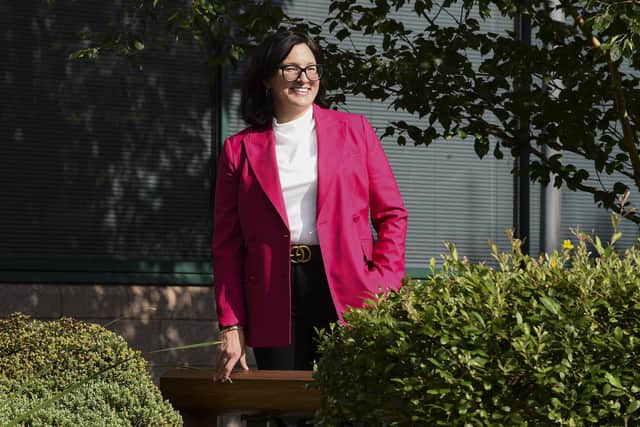The Big Interview: Scottish Business Resilience Centre chief executive Jude McCorry


Jude McCorry is chief executive of the Scottish Business Resilience Centre (SBRC), a non-profit organisation that says it exists to support and help protect Scottish companies, creating a secure environment where they can trade securely, regardless of size and sector. It was announced in February that she would take over from Eamonn Keane, who had taken on the role temporarily after the departure of Mandy Haeburn-Little.
McCorry has more than 20 years’ experience in the technology sector and was previously director of business development at The Data Lab, working with industry and academia to maximise the value of data for Scotland.


Advertisement
Hide AdAdvertisement
Hide AdWhat does your role involve and how has the SBRC adapted during lockdown?
My work with the SBRC began even before my official start date. With the pandemic approaching rapidly, we had to quickly modify the organisation’s strategy to mitigate the impact it would have on business resilience. This involved conversations with several people, including business advisor and founder Paul Atkinson, before I assumed the role to gauge how Covid-19 would hit Scottish businesses and the preparation of an action plan to guarantee they had resilience support for when it did.
Scotland plc is very driven, but Covid-19 presented the greatest unknown to the community, which caused understandable unease. We swiftly launched a webinar series to unite businesses and encourage candid discussion. It has proven hugely successful, with attendance of 4,000 businesses in Scotland. It was also a springboard for our mentoring programme, which currently has 50 businesses participating.
The unity that emerged because of the pandemic drove us to launch Scottish Business Cares, a goodwill collective in partnership with the Scottish Government, with support from Par Equity, Taranata Group, Droman Solutions, and Clark Communications.
Advertisement
Hide AdAdvertisement
Hide AdOver the last five months, we have all worked together to identify the challenges Scottish businesses are facing and provide guidance and support around these issues. The creation of this close-knit community has provided even the most experienced leaders with a new forum to share challenges and gain advice on how to move forward in the most unique situations.
Internally, we also had to make changes to how we work. Like many organisations, our workforce moved to remote working. We also saw the redeployment of team members who returned to vital roles within Police Scotland from where they were seconded. I am proud of how we have come together in a noticeably short amount of time to pivot how we work with extremely successful results.
How did your career progress before the SBRC and what led you to the organisation?
When I moved to Scotland from Ireland 17 years ago, my contacts book was empty. However, through the roles I have held and while completing my MBA that rapidly evolved. I have never shied away from opportunities to continually grow and develop my skills. Over the last decade or so, I have worked with various coaches and mentors to define my leadership style, and ways to look after myself to remain healthy and motivated.
Advertisement
Hide AdAdvertisement
Hide AdAlthough I aspired to be a CEO for several years, I was conscious of the positions I held as my children grew up. Both of them are now in high school, so when the SBRC position became available it was the right time for me to step up.
With a widespread move to remote working, lockdown has provided new opportunities for hackers. You have recently taken on an ethical hacker but what else are you doing to combat the issue and help Scottish businesses?
The SBRC has joined forces with the Scottish Government, Police Scotland and National Cyber Security Centre to create a one-stop cybercrime shop to provide businesses with advice.
We have seen a rise in this type of crime since the pandemic hit – with remote workers being targeted. CEO fraud (phishing emails that appear to be sent by a manager requesting that a member of staff make certain purchases) and personal protective equipment fraud (where equipment is purchased from fake online shops) have risen exponentially with fraudsters looking to exploit where they see a possible weak link in the chain.
Advertisement
Hide AdAdvertisement
Hide AdThis is not to say that homeworkers should be blamed in any way as these are unprecedented times. However, it is vital that businesses educate their staff on these situations and put in place good housekeeping, so they do not become victims.
We are launching an Incident Response Unit next month whereby any business that may have fallen victim to cybercrime can contact us for advice on managing it. Should more support be needed, we will put it in touch with one of our trusted partners.
And we will be collaborating with Police Scotland who will track and trace patterns in cyber-criminal activity. This aligned approach will hopefully go a long way towards Scotland being a leader in the prevention of cybercrime.
You have said Scotland has the opportunity to become a world leader in cyber and resilience – how can this be achieved?
Advertisement
Hide AdAdvertisement
Hide AdScotland is unique; often referred to as the Goldilocks economy whereby we generally see moderate growth. Due to our size, collaboration among organisations is a key strength, compared to some other big cities, and countries for that matter. However, we need to shed the typically Scottish bashful attitude and instead shout about our capabilities and strengths.
For example, Belfast has a strong cybersecurity scene and attracts funding because it promotes what happens there. Scotland needs to take a page from that book and raise its voice to attract more cyber organisations and, as a result, gain more funding.
You have been vocal about wanting to boost the gender balance in data science – can you give your thoughts on this?
I live by the motto “if you cannot see it, you cannot be it”. The technology sector (and the cybersecurity sector in particular) is renowned for its male bias, but there is absolutely no reason it must remain that way. At the core of it, cybercrime is about cracking a crime rather than being about technology – it is merely the conduit.
Advertisement
Hide AdAdvertisement
Hide AdThis requires education. If we can change the perception of various aspects of the technology industry – cybercrime included – then it will go a long way in increasing the accessibility of the sector, hopefully resulting in a better gender balance.
Thankfully, new games coming to the market like Roblox demonstrate that anyone can create and build games. But we need to move beyond the idea that tech is simply something you interact with to show how it will benefit them.
Just as children want to become teachers, doctors or vets, as they grow up they must start to learn about new careers that technology is bringing to the fore. This needs to be introduced early in primary school so they can aspire to something different as they grow up.
This is no easy task, but it will be the job of technology businesses to go into schools to educate and present a balance of genders working in the sector.I am proud to be a woman working in the technology sector and take every opportunity to raise my voice to ensure girls can see what they could be when they grow up.
Advertisement
Hide AdAdvertisement
Hide AdYou are one of the founders of the Unicef Data Hub for Children and you are also an advisory board member at Parkinson’s Scotland. Can you explain more about the importance of the social aspect to your work?
From using technology to identify and help children on the edge of care, to using iPhones to remind those who have Parkinson’s disease to take their medication at a certain time, or tracking disease progression for consultants to adapt care plans, there are so many ways technology can be used for good.
I actively promote this idea in my work with Unicef and Parkinson’s Scotland. I joined these organisations to address injustice and I am passionate about how technology could contribute to a solution, and how we can all use our skills and network for the greater good.
Who do you admire in the business world?
Covid-19 has highlighted many unsung heroes and I respect every one of them for a variety of reasons. Regionally, I think people including Chris Martin at Waracle and Graeme Gordon from IFB have done wonderful things to elevate their communities in Dundee and Aberdeen respectively. But I have a newfound respect for anyone who has given up their time to support the Scottish business community.
A message from the Editor:
Advertisement
Hide AdAdvertisement
Hide AdThank you for reading this story on our website. While I have your attention, I also have an important request to make of you.
The dramatic events of 2020 are having a major impact on many of our advertisers - and consequently the revenue we receive. We are now more reliant than ever on you taking out a digital subscription to support our journalism.
Subscribe to scotsman.com and enjoy unlimited access to Scottish news and information online and on our app. Visit https://www.scotsman.com/subscriptions now to sign up. By supporting us, we are able to support you in providing trusted, fact-checked content for this website.
Joy Yates
Editorial Director
Comment Guidelines
National World encourages reader discussion on our stories. User feedback, insights and back-and-forth exchanges add a rich layer of context to reporting. Please review our Community Guidelines before commenting.